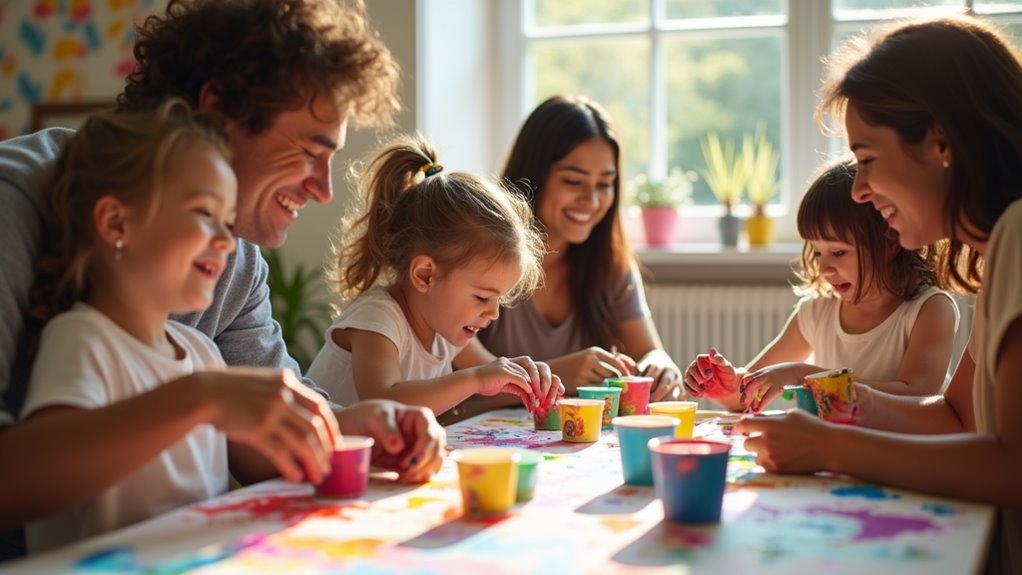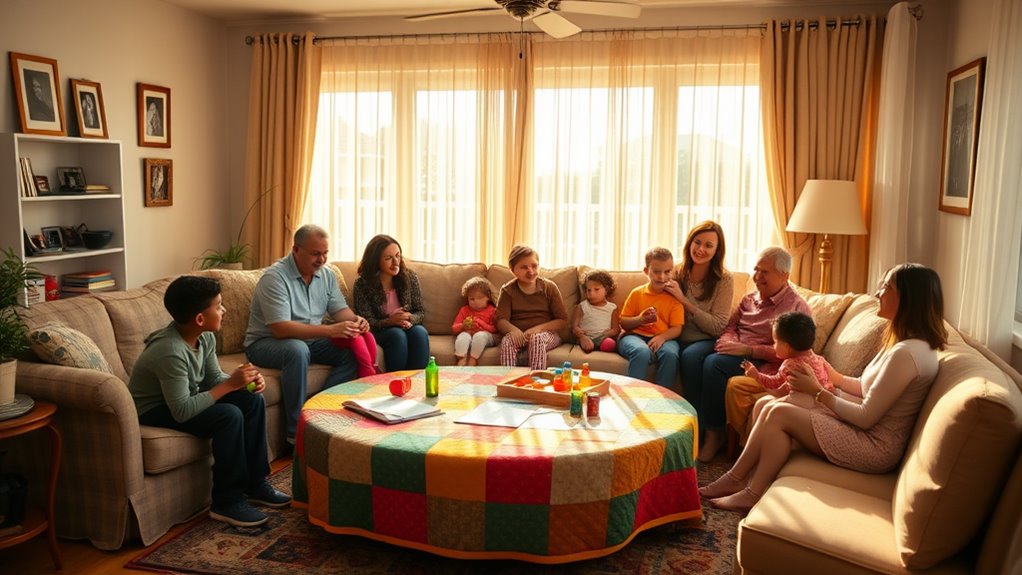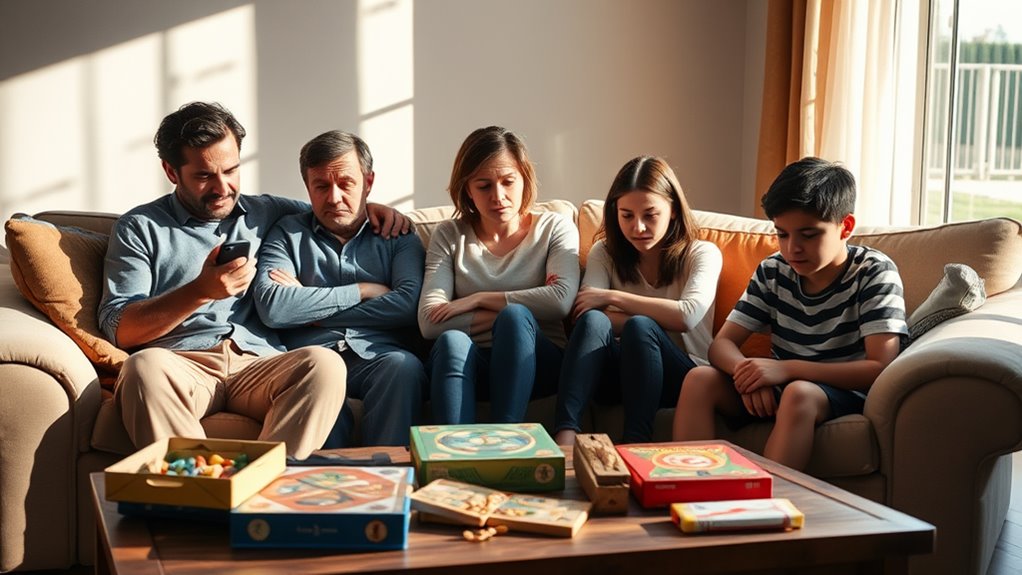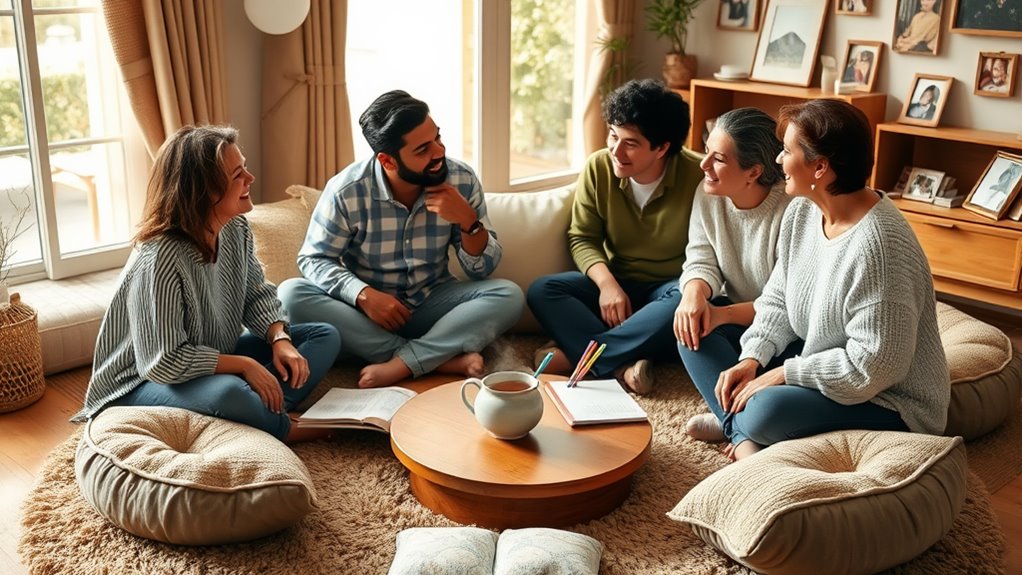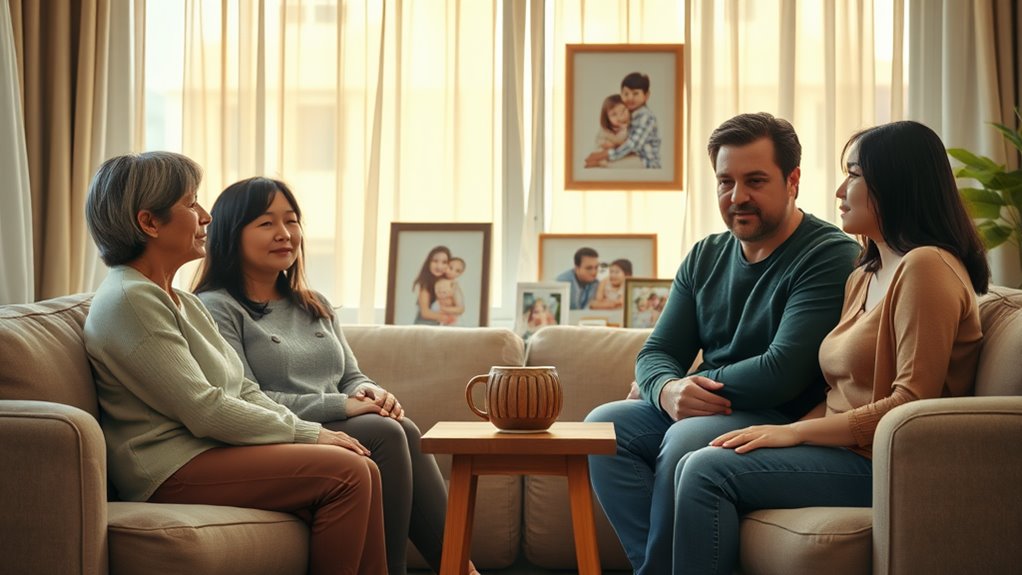Workshops can really help strengthen your family relationships by teaching you important skills like communication and conflict resolution. Through fun activities and shared experiences, everyone can get closer and learn to express their feelings better. You’ll discover tips to handle disagreements calmly and even find hidden talents within family members. Plus, these workshops create a safe space where you can discuss issues openly, building trust among everyone. It’s like having a family fun day, but with a purpose! If you’re curious about the different types of workshops available, you’ll find plenty more to explore.
Importance of Family Communication
Effective family communication forms the backbone of healthy relationships. When you talk openly and listen to each other, you create a warm environment where everyone feels valued. It’s like having a cozy blanket on a chilly day—comforting and safe!
Good communication helps you share thoughts and feelings, making it easier to solve problems together. Imagine trying to build a tower with blocks, but no one can agree on how to stack them. Frustrating, right?
But when you communicate well, you can decide together, making that tower even taller!
You might be surprised to know that even simple things, like asking about each other’s day, can make a big difference. It shows you care and want to know more.
Plus, sharing laughs and inside jokes can lighten the mood, making family time more enjoyable.
Types of Workshops Available
There are numerous types of workshops available to enhance family relationships, catering to various needs and preferences.
Some workshops focus on communication skills, where you’ll learn how to express feelings and listen better. Imagine a space where everyone can share their thoughts without fear of being judged—sounds great, right?
Other workshops might center around conflict resolution. You’ll discover techniques to solve disagreements without turning into a family wrestling match!
Then there are bonding workshops, which often include fun activities like games or outdoor adventures. You’ll not only strengthen your connections but also create lasting memories.
Parenting workshops are another fantastic option for those looking to improve their parenting skills. Here, you’ll gain insights into effective strategies and learn how to handle those tricky teenage years—because who wouldn’t want a little help with that?
Lastly, there are workshops focused on family wellness, which promote healthy habits and stress management. You can explore mindfulness techniques together and find ways to relax as a family.
Benefits of Participating in Workshops
Participating in workshops can greatly enhance your family dynamics. You’ll find that these sessions offer a fun way to connect with each other while learning valuable skills. Imagine sitting in a cozy room, sharing laughs and stories, all while discovering new ways to communicate better. Sounds great, right?
One of the biggest benefits is that you get to meet other families. You can share experiences, ideas, and even a few laughs about the ups and downs of family life. It’s comforting to know you’re not alone in facing challenges. Plus, you’ll pick up tips and tricks that you can easily apply at home.
Workshops often focus on activities that strengthen bonds, like teamwork exercises or trust-building games. These activities can be a blast! You might even find yourself cheering for your family members as you tackle fun challenges together.
In addition, you may discover hidden talents within your family. Who knew Uncle Joe could juggle or that your sister has a knack for storytelling?
Enhancing Conflict Resolution Skills
Conflict resolution is an essential skill for any family, and workshops can provide the perfect environment to develop it. You might think that resolving conflicts is as simple as saying, “I’m sorry,” but it’s more than that.
In workshops, you can learn techniques to handle disagreements calmly and respectfully. Imagine sitting in a cozy room with your family, practicing how to listen to each other without interruptions. Sounds fun, right?
You’ll discover ways to express your feelings without escalating the situation. For example, instead of shouting, “You never listen to me!” you might say, “I feel ignored when you don’t respond.” It’s all about using “I” statements to express how you feel, not just pointing fingers.
Workshops often include role-playing activities, which can be both hilarious and enlightening. You get to practice real-life situations in a safe space, and you might even laugh at how silly some arguments can be.
Plus, you’ll gain tools to cool down when tempers flare. By enhancing your conflict resolution skills, you’re paving the way for healthier family conversations, where everyone feels heard and valued. That’s a win-win!
Building Trust Among Family Members
Trust serves as the foundation of any strong family relationship, and building it requires intentional effort and open communication. It’s like building a bridge; each conversation helps you lay down another plank. When you talk openly, you show each other you care, and that’s a big step toward building trust.
Start by being honest and sharing your feelings. If something’s bothering you, don’t keep it bottled up like a soda can ready to explode! Instead, express yourself calmly and respectfully.
It’s also important to listen. When family members feel heard, they’re more likely to trust you in return. Think of it as a game; the more you play, the better you get!
You can also create little rituals, like family meetings or game nights. These can help strengthen connections and open the door for deeper conversations.
Just remember, trust isn’t built overnight—it takes time, patience, and practice.
Activities That Foster Connection
Engaging in activities together can greatly strengthen family bonds and create lasting memories. Think about it: when you share fun experiences, you’re building connections.
Whether it’s a game night, cooking a meal, or going on a nature hike, these moments bring everyone closer. You might even discover hidden talents! Maybe your sibling is a master chef, or your cousin has some impressive karate moves.
Try planning a family project, like creating a scrapbook or raising a garden. Not only do these activities spark creativity, but they also encourage teamwork.
You’ll laugh, argue over the best way to do things, and ultimately feel accomplished together.
Don’t forget the power of simple traditions. Weekly movie nights or monthly outings to a local park can create excitement and anticipation.
Plus, it’s a great way to catch up with each other’s lives.
Role of Facilitators in Workshops
Facilitators play an essential role in workshops, guiding families through activities designed to enhance their relationships. They’re like the friendly tour guides of the family world, helping everyone navigate through discussions and exercises.
You might wonder, how do they do this? Well, facilitators create a fun and engaging atmosphere where everyone feels comfortable to share, laugh, and maybe even shed a tear or two.
They help set the pace, making sure that each activity is enjoyable while still getting to the heart of the matter. You get to explore communication, trust, and understanding, all while having a good time. Think of them as the glue that holds everything together, ensuring that no one feels left out or overwhelmed.
Facilitators also encourage open dialogue. They ask questions that prompt thought, helping you see things from different perspectives.
And let’s be honest, sometimes a little humor goes a long way in easing tension! So, when you join a workshop, remember that these awesome facilitators are there to help you strengthen those family bonds, making the journey as enjoyable as the destination.
Creating a Safe Space for Sharing
How can families feel comfortable sharing their thoughts and feelings during workshops? Creating a safe space is key! When everyone knows they can express themselves without judgment, magic happens.
First, set clear rules. Everyone should understand that what’s shared in the room stays in the room. This helps build trust.
Next, encourage active listening. When family members feel heard, they’re more likely to open up. You might even want to practice this by having each person repeat what someone else said before sharing their own thoughts. It sounds silly, but it works!
Also, keep the atmosphere relaxed. Don’t be afraid to sprinkle in some humor or light-hearted activities. A little laughter can ease tension and make sharing feel less intimidating.
Lastly, remind everyone that feelings are valid. Whether someone’s upset, happy, or confused, it’s okay to share those emotions. Celebrate the courage it takes to be vulnerable!
Long-term Impact on Relationships
Creating a safe space during workshops not only encourages open sharing but also lays the groundwork for long-term positive impacts on family relationships. When you and your family engage in discussions, you build trust. That trust helps everyone feel comfortable being their true selves, which is super important!
As you learn together, you start to understand each other better. You might discover things about your family members that surprise you, like hidden talents or funny stories. These moments strengthen your bonds and make you closer.
Plus, you learn valuable communication skills, like active listening and expressing feelings. These skills don’t just vanish after the workshop ends. You can carry them into everyday life, turning small moments into opportunities for connection.
Remember that time when you all laughed over a silly joke? Imagine making more of those moments happen!
Over time, the positive changes can lead to healthier relationships, fewer misunderstandings, and a more supportive family environment. So, whether it’s a workshop or a living room chat, keep the conversation going. Your family will thank you for it!
How to Choose the Right Workshop
When you’re looking for the right workshop, it’s important to contemplate your family’s unique needs and dynamics.
Think about what areas you’d like to improve—communication, trust, or maybe just having more fun together? Make a list of goals. This helps narrow down your options and keeps you focused.
Next, consider the workshop format. Some workshops are interactive, while others might involve more lectures.
If your family loves to chat and share, a hands-on workshop could be perfect. On the other hand, if you prefer listening and reflecting, a more structured approach might fit.
Don’t forget to check out the facilitators. Look for someone who’s experience working with families and can relate to your situation.
Reading reviews can give you a glimpse of what to expect.
Lastly, think about location and timing. You want something convenient that won’t disrupt your family’s schedule.
Success Stories From Families
Many families have experienced transformative moments through workshops, and their stories highlight the real impact of these experiences.
Take the Johnsons, for example. They attended a family workshop hoping to improve communication. At first, they thought it was just a bunch of talking, but soon they discovered new ways to express their feelings. Now, instead of arguing about chores, they share responsibilities and laugh about it!
Then there’s the Martinez family. They signed up for a workshop to spend more quality time together. They learned fun games and activities that brought them closer. Now, they’ve “Family Fun Fridays,” which everyone looks forward to. Who knew that playing games could strengthen family bonds?
Finally, the Smiths faced some tough times after a big move. They felt lost and disconnected. After attending a workshop, they learned how to support each other better. With a little humor and understanding, they turned their new house into a home.
These success stories show that workshops can be more than just lessons—they can ignite change and create lasting memories.
If you’re considering one, remember, it might just spark your family’s next great adventure!

